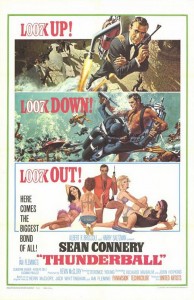 This weekend marks the North American debut of the latest James Bond movie Skyfall. It just had the biggest Bond opening ever with a $88 million debut. Worldwide it’s already made $500 million. Not too shabby but if you adjust for inflation Thunderball kills all the other Bond movies with an adjusted worldwide gross of $1,014,941,117.
This weekend marks the North American debut of the latest James Bond movie Skyfall. It just had the biggest Bond opening ever with a $88 million debut. Worldwide it’s already made $500 million. Not too shabby but if you adjust for inflation Thunderball kills all the other Bond movies with an adjusted worldwide gross of $1,014,941,117.
October marked the 50th anniversary of James Bond’s cinematic debut and I wanted to address it a little bit but Halloween and 31 Days of Horror interrupted my plans. So here it is in time for the latest Bond film. Thunderball was the fourth Bond film made and Fleming’s ninth novel but it was really the birth of the cinematic James Bond.
Ian Fleming first created James Bond with Casino Royale in 1953. The book launched a series of James Bond novels. In those early novels there was no gadgets and the villains were all agents of SMERSH, an evil counter intelligence Russian organization that means death to spies. In the first novel Bond’s love interest Vesper Lynd is discovered to be a double agent for SMERSH. After that event Bond swears revenge against the organization and in the subsequent novels he’s foiling and destroying the group at ever chance he gets.
Casino Royale was adapted for the TV series Climax in 1954. In 1958 Fleming had decided move Bond unto the big screen. He contacted Kevin McClory, who had previous worked as assistant to John Huston on several movies. McClory had looked at Fleming’s novels and decided that none of them were film worthy. Instead they decided to create a new story to bring James Bond to the big screen. McClory, Fleming and screenwriter Jack Whittingham worked for a year on the story, through several drafts and came up with a story called Longitude 78 West. Fleming retitled the story Thunderball. McClory was unable to secure funding for the film and the deal fell through. In 1961 Fleming sold the movie rights to the Bond novels to Albert R. Broccoli and they made Dr. No the first Bond film.
During the writing of the screenplay for Thunderball, several things were created. Most significantly was SPECTRE (Special Executive for Counter-intelligence, Terrorism, Revenge, and Extortion) and Blofeld. There has been some argument of who created what with nothing really being resolved. In 1960, Fleming adapted the screenplay into what became his ninth James Bond novel. Of course he left out the other two parties who helped write the story. In 1961 McClory sued Fleming over the rights to the story. Fleming, a heavy smoker and drinker, suffered a heart attack during the case. He decided to settle. The end result was that MCClory won the literary and film rights for the screenplay and Fleming retained the rights for the novel. But the plot of Thunderball would shape the cinematic world of Bond.
SMERSH was removed for the Bond movies and replaced with SPECTRE. Dr. No was no longer an agent of SMERSH but an agent of SPECTRE. Blofeld was introduced in the second Bond film, From Russia With Love. The basic plot for Thunderball also became part of the Bond formula for the movies. An evil villain threatening the world, who usually has an evil fortress / lair, there’s always a helper or assistant for Bond, there’s always a victim who helped Bond, the villain has a henchman, and of course there’s alwasy the Bond girl.
After the success of Goldfinger, it was decided to work with McClory to bring Thunderball to the big screen. Fleming had died in 1964 of a heart attack at age 56 so there wasn’t much conflict to bring in McClory. McClory was given producer’s credit and the film became the biggest grossing Bond film at the time. McClory would later try to use his rights on the story to make his own Bond films and faced a lot of resistance from the Fleming estate. He would eventual succeed and remake Thunderball in 1983 with Never Say Never Again. McClory would later try again to remake the film but plans were scrapped. However he sold his rights to Sony in 1997 with Sony intending to make their own Bond films. This was met with another lawsuit that ended with Sony giving up all claims to Bond. Ironically in 2005, Sony bought a bankrupt MGM and acquired James Bond. They’ve been co-producing the movies ever since.
http://www.youtube.com/watch?v=ElyENM6i0xg
